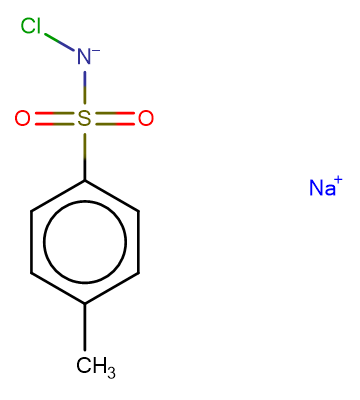
Chloramine-T
CAS No. 127-65-1
Chloramine-T( Acti-chlore, AI3-18426C, Aktivin, Anexol, Aseptoclean )
Catalog No. M11149 CAS No. 127-65-1
Tosylchloramide or N-chloro tosylamide, sodium salt, sold as chloramine-T, is a N-chlorinated and N-deprotonated sulfonamide used as a biocide and a mild disinfectant.
Purity : >98% (HPLC)
 COA
COA
 Datasheet
Datasheet
 HNMR
HNMR
 HPLC
HPLC
 MSDS
MSDS
 Handing Instructions
Handing Instructions
| Size | Price / USD | Stock | Quantity |
| 500MG | 38 | In Stock |


|
| 1G | 45 | In Stock |


|
Biological Information
-
Product NameChloramine-T
-
NoteResearch use only, not for human use.
-
Brief DescriptionTosylchloramide or N-chloro tosylamide, sodium salt, sold as chloramine-T, is a N-chlorinated and N-deprotonated sulfonamide used as a biocide and a mild disinfectant.
-
DescriptionTosylchloramide or N-chloro tosylamide, sodium salt, sold as chloramine-T, is a N-chlorinated and N-deprotonated sulfonamide used as a biocide and a mild disinfectant. It is a white powder that gives unstable solutions with water.
-
In Vitro——
-
In Vivo——
-
SynonymsActi-chlore, AI3-18426C, Aktivin, Anexol, Aseptoclean
-
PathwayOthers
-
TargetOther Targets
-
RecptorOthers
-
Research AreaOther Indications
-
Indication——
Chemical Information
-
CAS Number127-65-1
-
Formula Weight227.65
-
Molecular FormulaC7H7ClNNaO2S
-
Purity>98% (HPLC)
-
SolubilitySoluble in Water
-
SMILESS(=O)(=O)(c1ccc(cc1)C)[N-]Cl.[Na+]
-
Chemical NameBenzenesulfonamide, N-chloro-4-methyl-, sodium salt
Shipping & Storage Information
-
Storage(-20℃)
-
ShippingWith Ice Pack
-
Stability≥ 2 years
Reference
1.Boran H, Altinok I. J Fish Dis. 2014 May; 37(5):431-4
molnova catalog



related products
-
D-(-)-Penicillamine
(2S)-2-Amino-3-methyl-3-sulfanylbutanoic acid is the most characteristic degradation product of the penicillin antibiotics.
-
Palmitoyldocosahexae...
Palmitoyldocosahexaenoyl phosphatidylcholine, an endogenous metabolite.
-
Fraxinol
Fraxinol is a predicted metabolite generated by BioTransformer1 that is produced by the metabolism of 5 7-dimethoxy-2h-chromen-2-one.



 Cart
Cart
 sales@molnova.com
sales@molnova.com


